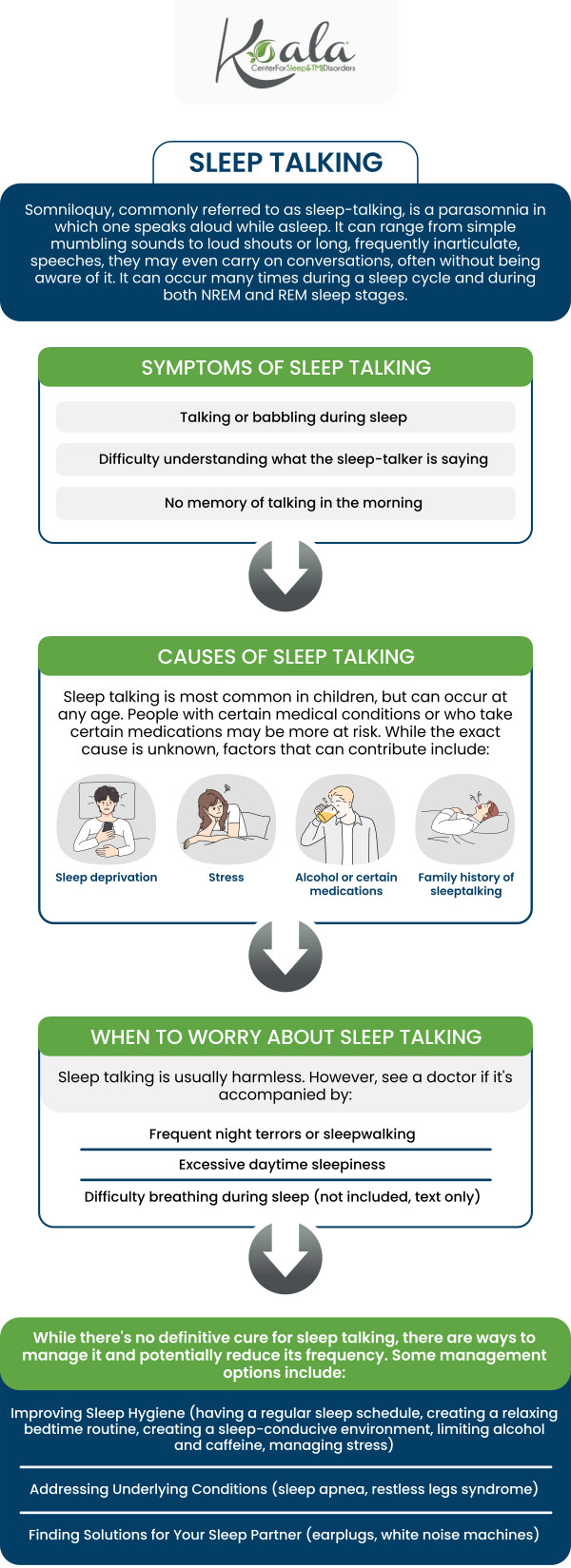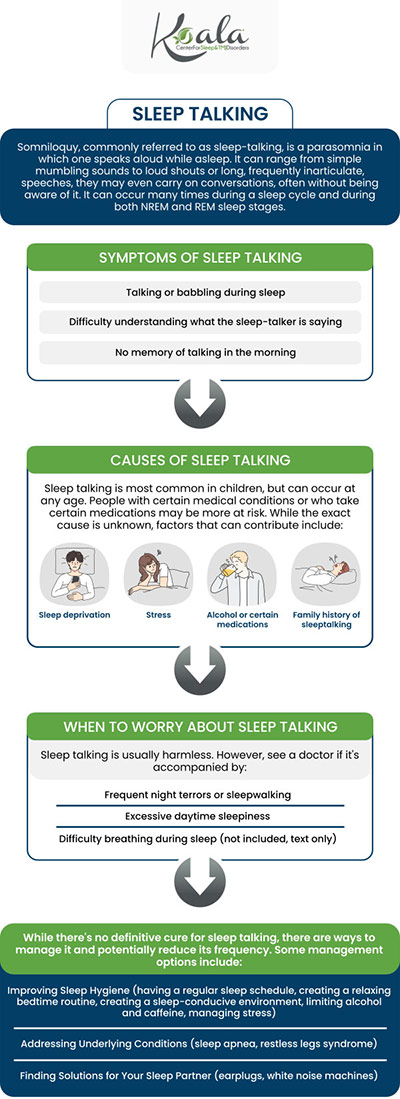Everything You Need to Know About Sleep Talking
Sleep talking, a common occurrence without underlying issues, is generally harmless but can indicate serious sleep disorders like night terrors or REM sleep behavior disorder. If you or someone you love wants to get rid of sleep-talking habits, come to Our professionals at Koala® Center For Sleep & TMJ Disorders. For more information, please contact us or book an appointment online now! We have convenient locations across the USA in Bloomington IL, Peoria/Dunlap IL, El Paso TX, and Wausau WI.




Table of Contents:
How do I stop talking in my sleep?
Is sleep talking serious?
What medication causes talking in your sleep?
During which stage of sleep are you most likely to talk in your sleep?
Do You Sleep Talk? Find Answers and Solutions at Koala Sleep Centers
Sleep talking, also known as somniloquy, is a common type of parasomnia that is usually not considered a medical problem. Typically, nighttime chatter is harmless; however, it can also be vulgar, R-rated, or disturbing to others. While most sleep-talking episodes are brief, lasting less than 30 seconds, it’s common for people to talk in their sleep many times a night.
Sleep talking can occur at any stage of sleep. Some of the things that can cause sleep talking include emotional stress, fever, certain medications, and certain conditions. If you are concerned about sleep talking episodes, or if they involve intense fear, screaming, or aggressive actions, it’s important to speak with a sleep expert.
When you visit a sleep expert, they will go over your medical history, the medications you currently take, and your lifestyle habits to understand the factors that may be triggering sleep-talking episodes. If more insight is needed, a sleep recording or sleep study may be used. With these findings, the provider will make recommendations to reduce sleep talking as well as improve your sleep quality.
Usually, sleep talking is considered harmless and poses no significant health risks. It’s a common occurrence and often arises without any underlying issues. However, it’s essential to understand that in some cases, sleep talking can indicate more serious sleep disorders, such as night terrors, REM sleep behavior disorder (RBD), or more complex conditions. While these conditions are relatively rare, they can have a considerable impact on sleep quality and overall well-being.
If sleep talking becomes frequent or is accompanied by other troubling symptoms, you should see a sleep expert to discuss your concerns and receive comprehensive care. As sleep quality can have a significant impact on your overall quality of life, it’s important to be proactive and see a professional before sleep disturbances escalate or significantly affect your daily functioning.
Various medications, such as prescriptions, over-the-counter drugs, and supplements, can affect your sleep as a side effect. For example, certain antidepressants and sedatives, such as alprazolam, citalopram, and zaleplon, may cause sleep talking.
In addition, medications that contain stimulants, including some drugs used to treat ADHD, can affect sleep patterns. People using these medications might experience lighter or more fragmented sleep, which can increase the chances of sleep talking. Furthermore, mental health issues such as depression, anxiety, and post-traumatic stress disorder (PTSD) are linked to sleep disturbances, such as sleep talking.
If sleep talking is troubling or occurs suddenly, it’s always a good idea to discuss this with a healthcare provider. A sleep expert can help you pinpoint the factors that could be contributing to your sleep talking, whether it be medication, stress, or something else.
Sleep talking can occur during any stage of sleep, including rapid eye movement (REM) and non-REM sleep. However, it is most associated with the deeper stages of non-REM sleep, specifically during the delta-wave NREM sleep stages. This is similar to other sleep disorders like sleepwalking, which also predominantly occur during these deeper, non-REM stages of sleep.
During the lighter stages of non-REM sleep, the speech in sleep talking tends to be more comprehensible and can sometimes involve more complex sentences. As sleep deepens into stages 3 and 4, where the brain produces delta waves, sleep talking often becomes less intelligible and might be limited to simple sounds or gibberish.
So, while sleep talking can happen at any point throughout the night, how comprehensible the speech will be depends on whether it occurs during deep REM or lighter non-REM sleep. To learn more about sleep talking and how to improve your sleep quality, you should schedule a visit with one of the knowledgeable providers at Koala® Center For Sleep & TMJ Disorders.
Do you find yourself talking in your sleep, or has a partner told you that you do? While it can be a source of humor, sleep-talking can also be a sign of an underlying issue, like a sleep disorder, stress, or even a medical condition. At Koala® Center For Sleep & TMJ Disorders, we understand that sleep-talking can be disruptive and concerning. Our team of specialists is dedicated to providing expert diagnosis and personalized solutions to help you understand why you’re talking in your sleep. We offer a range of effective treatments to help you find a quieter, more restful night’s sleep, so you can stop talking and start getting the rest you deserve. Call us today to schedule your consultation with our providers.

Additional Services You May Need
▸ KoalaKIDZzz®
▸ Sleep Apnea
▸ Snoring
▸ TMJ Disorder
▸ Fatigue
▸ Sleep Disorders
▸ Weight Loss
▸ CPAP Alternative
▸ Oral Appliances




